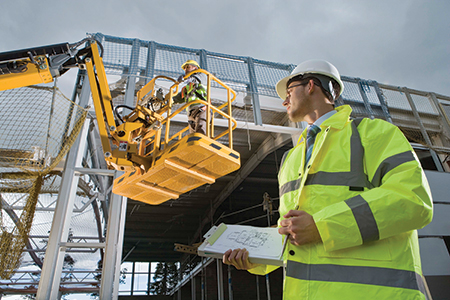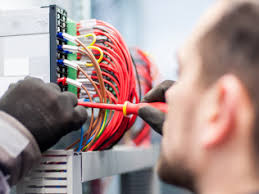HOW TO CHOOSE A COMMERCIAL ELECTRICIAN
If you’re a commercial property owner in Saugus, Massachusetts or surrounding areas, you probably don’t spend too much time thinking about electricians. Most days, your lights turn on the way they should, you and your tenants are satisfied with internal and external lighting, and you go about your day thinking about more important things.
But then something goes wrong.
There’s an ice storm and your entire building loses power. Or a pesky tenant plugs in a piece of new equipment and blows the circuit for the entire building. Or maybe your air conditioning unit goes out in the middle of summer and you’re at risk for losing all of your perishable inventory
WHY YOUR COMMERCIAL ELECTRICIAN MATTERS
Sure, you could conduct a quick Google search for “electrical services in New Haven” or even pick up the good, old fashioned phone book and call the first commercial electrician you see. But that’s rarely the best way to find an emergency electrician you trust.
CAN THEY MEET YOUR COMMERCIAL DEMANDS?
Let us be perfectly clear, not every electrician in Saugus is cut out to be a commercial electrician, especially if you have a particularly large company. The equipment, skills, and team size of a residential electrician are vastly different than a commercial electrician. Commercial and residential electrical work are completely different in terms of energy needs, load demands, and equipment setup. Hiring the wrong one can mean a delay in repairs, which translates to lost revenue for your company
DO THEY HAVE PROPER LICENSING & INSURANCE?
Even if a commercial electrician has the skills, it’s not worth hiring them unless they also have the proper licensing and insurance to work in your state. Hiring an electrician who’s not properly licensed and insured could be a financial disaster for your Saugus business if something goes wrong during the repairs.

Commercial Electrical Remodeling
Building Rewiring: If you frequently experience electrical problems in your commercial building, you could have faulty electrical wiring. In order to put an end to these problems for good, you might want to talk to the team at Delta Electric about rewiring your building. We can take a look at your system and find out if rewiring is necessary to put your problems to rest and allow you to focus on your business.
Electrical Updates: We can help you decide where new outlets will go and install them correctly to adapt to your electrical wiring. Electrical updates can ensure your electrical components are fully functional and won’t slow down your day-to-day operations.
Safety Inspections: Whether you’re moving into a new commercial building or upgrading your existing structure, we’ll make sure it’s safe to do so. Our team will ensure your building is up to code and safe to work from. We know what areas in a building to look at, the signs of a problem or faulty electrical system, and more.

How to Choose the Right Electrical Contractor for Your Business
In this industry, technology is constantly evolving. When you’re in the market to hire a new electrical contractor, it’s obviously crucial that who you hire is trustworthy and abreast of all the changing technology and stays up-to-date. When your electrical contractor is ahead of the curve, your business will not only become more efficient, but you’ll save money, too. Here’s what to look for when choosing the right electrical contractor for your business.
New Certifications
Certifications let you know that your electrical contractor has received and understands the latest developments in the field. But there are more than just certifications for installing and maintaining electrical equipment, there are also certifications for doing these things safely. You and your employees have probably undergone some form of basic OSHA safety training. The right electrical contractor company will undergo a more rigorous, specialized OSHA–30 certification, which means that the employees of that company have received 30 hours of training centered around things such as current common electrical hazards, personal protective equipment, hazardous locations, and proper wiring methods. Be sure to ask your prospective companies if their technicians have undergone OSHA-30 training. This will be a sign to you that the company is not only doing things to the highest standard, but they’re doing it safely as well.
They Recommend ARC Flash Studies
An ARC flash study is a complete examination of your electrical system. It helps assess the level of risk in your workplace. These studies ensure that your factory is completely compliant with local, national and even international standards by finding issues with your electrical system and bringing them to your attention, and allowing you to fix them. It also helps to ensure the safety of your employees and protects your equipment (as well as your building) by identifying maintenance needs such as poor connections, neglected equipment and contamination, all of which could lead to short circuits and fires.
They Provide Lift Training
Sometimes, electrical equipment and wires are located up out of safe reach, even with the use of a ladder. In these instances, lifts are often used. But not just anyone can use one. Lift equipment requires special training. The employees of your electrical contracting company have this training. You may not be able to, or need to, call the company every time you need something addressed. The right electrical contractor will provide lift training so that some of your employees can operate a lift properly and take care of smaller needs.
They Conduct Regular Safety Meetings
Sure, there’s a safety handbook. And everyone knows the basic rules. But, even so, someone might forget something, or do something they find easier, but is not necessarily safe. Not only that, but there are periodic updates to the safety regulations. It’s important that everyone is aware of these safety updates, and on the same page about proper safety procedures and protocols. In order to do this, your electrical contracting company should conduct regular safety meetings throughout the year. This helps to ensure that no matter who is sent out to your company, they will all adhere to the latest, proper regulations.

How to Find Electricians: Find the Best Electrician for You
Finding yourself in need of the services of a professional electrician is not an everyday occurrence for homeowners or business owners, so many find themselves unsure where to look to find qualified local electricians, how to determine the best electrician for the job, and what certifications and qualifications a professional electrician should have.
Don’t attempt electrical work yourself if you’re inexperienced.
“A faulty wiring system in a home is a fire that is waiting to happen. For this reason, it is important that you hire a highly qualified and experienced electrician. Wiring is a vast and interdependent network and needs to be done with precision. Even circuits that appear safe, but poorly designed cause damage to electric equipment and appliance motors. This is due to the fact that they can deliver the wrong amount of amperage. These electrical problems may sometimes affect your lighting in your home. The decision to hire a qualified and experienced electrician can possibly save you from these problems while avoiding safety hazards as well.”
Most electrical work should be done by a licensed electrician.
“Anything beyond changing out a light fixture, light switch or electrical outlet should be done by a licensed electrician. If you are dealing with new construction and want to save a few dollars on labor costs, you can attach outlet, switch, and light boxes to the framing but leave all wiring to the electrician. These electrical boxes should be attached firmly to the framing and you should consult an electrician as to the positioning and location of the boxes.”
Attempting an electrical project yourself could mean risking injury to yourself or the loss of thousands of dollars in materials.
“If you’re clueless about this specific job and have never seen it performed before, don’t risk hurting yourself or wasting thousands of dollars on materials. If the task is beyond your comfort zone, call for electrical service.”
Attempting electrical work that you’re not qualified to perform could leave your home at risk of an electrical fire.
“Some home projects just simply need professionals and remain difficult for even experienced amateurs. According to the Electrical Safety Foundation International, people experience more than 30,000 shock injuries annually, while FEMA tells us that about half of all home fires start from electrical issues.“What does it mean? On one hand, most people are prone to injuries when attempting electrical work on their own. On the other hand, your DIY work might come back to haunt you; it’s very dangerous to live with electrical work done by an amateur.”
MAKING THE JUMP FROM RESIDENTIAL TO COMMERCIAL CONSTRUCTION
If you are a residential contractor, you likely spend considerable downtime contemplating ways to increase company revenues. But, aside from improving efficiency, greater revenues are often realized only by way of greater sales, and additional work can prove hard to come by in an already competitive local market. So where does one go for new opportunities? Well, instead of laboring to wring every last drop out of your current residential market, maybe it’s time to expand the market itself. Maybe it’s time to look into commercial construction.
NEW HORIZONS?
But I know what you’re feeling—apprehension, uneasiness, and that’s understandable. To those not yet indoctrinated, commercial construction (CC) can appear daunting. Suddenly there are architects, engineers, liquidated damages, bonding, and a cast of wealthy business clients with short attention spans and scary-sounding law firms on speed-dial. There are new regulations, strict protocols, and new competition. “I wouldn’t know where to begin,” you tell yourself.
Well, I was in your shoes. I was in residential construction ten years before getting into commercial work (which is 25 years and counting now), and I can attest that the transformation from residential to commercial construction was (in no particular order) exciting, terrifying, exhilarating, frustrating and rewarding. There were unknowns, hurdles and, admittedly, leaps of faith. There was a risk. But most of us have learned that without this pesky little thing known as risk, there’s often little chance for any worthwhile reward.
FINDING COMMERCIAL CONSTRUCTION WORK: REPORTING SERVICES
As a residential contractor, new work likely came via local advertising, your website, personal referrals, and industry contacts (i.e., real estate brokers, material suppliers). These are still great strategies for acquiring work in CC, but there are other avenues for an opportunity in place for you. One of these is known collectively as reporting services
These services are for construction managers (CMs), general contractors (GCs), subcontractors, suppliers and anyone with a vested interest in commercial construction work. Most of these reports include pertinent details regarding the project such as a description of the work itself, the architect/engineer (A/E), the owner and even bidding companies currently holding plans. They’ll also give a bid date/time and may even tell you how to go about acquiring bidding documents (many sites even offer downloadable electronic versions).